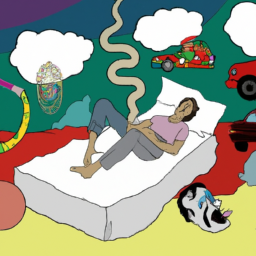Lately, I have been having some particularly odd dreams that make me feel uneasy when I wake up in the morning.
It’s not just the content of my dreams that is strange, but also the vividness and intensity with which they play out.
At first, I thought maybe it was just a fluke or something I ate before bed, but these dreams have been happening consistently over the past few weeks.
So, what’s going on? Why am I having such bizarre dreams?
After doing some research and talking to experts in the field, there are actually many reasons why someone may experience weird or vivid dreams.
It could be related to stress and anxiety, certain medications or substances we consume, sleep disorders like sleep apnea or insomnia, our diet and nutrition habits, lucid dreaming experiences, psychological factors like depression or trauma, and even dream interpretation can shed light on what our subconscious mind is trying to tell us through our dreams.
In this article, we’ll explore all of these potential causes for weird dreams and offer some tips for better sleep hygiene to help reduce their frequency.
Key Takeaways
- Weird dreams can have various causes, including stress, medications, sleep disorders, diet, and psychological factors.
- Environmental factors such as temperature, noise, lighting, and air quality can impact dream experiences.
- Practicing good sleep hygiene habits can reduce the frequency of weird dreams, including establishing a relaxing bedtime routine and avoiding screens before bed.
- Lucid dreaming techniques and dream analysis can provide insight into subconscious thoughts and increase control over dream content.
Common Types of Weird Dreams
You’re not alone in experiencing freaky dreams – there are some common types that can leave you feeling puzzled and uneasy.
One type of weird dream is a nightmare, which can be characterized by feelings of fear, anxiety, and even terror. Nightmares often involve situations where the dreamer feels threatened or powerless, such as being chased or attacked by someone or something. They may also involve recurring themes such as falling or being trapped in a confined space.
Another type of weird dream is a lucid dream, where the dreamer is aware that they’re dreaming and may even have some control over what happens in the dream. Lucid dreams can be both fascinating and unsettling, as they blur the line between reality and imagination. They may involve surreal or fantastical elements that would never occur in real life.
Recurring vs. one-time weird dreams can also occur for various reasons. Some people may experience strange dreams only once in a while, while others may have recurring nightmares or lucid dreams on a regular basis. Understanding common types of weird dreams can help you better understand why you might be having them yourself, but stress and anxiety can also play a significant role in causing unusual sleep experiences.
Stress and Anxiety
Feeling like a tightly wound spring can cause your mind to race and spin in circles, like a hamster on its wheel, leading to vivid and unsettling dreams. Stress and anxiety are common triggers for strange dreams because they affect the way we think and feel both consciously and subconsciously.
If you find yourself constantly worrying about things that haven’t happened yet or feeling overwhelmed by daily pressures, it’s no wonder your mind is struggling to relax at night. To combat stress-induced nightmares, there are several techniques you can try.
First, consider incorporating meditation into your daily routine. Even just a few minutes of deep breathing or visualization exercises can help calm your mind before bed. Second, regular exercise has been shown to reduce stress levels and improve sleep quality overall. Finally, make sure you’re practicing good sleep hygiene habits such as avoiding electronics before bedtime and creating a relaxing environment in your bedroom.
As we’ll discuss in the next section about medications and substances, sometimes these techniques aren’t enough to fully alleviate weird dream symptoms. However, they’re still worth trying as they have numerous other benefits for both physical and mental health.
Medications and Substances
Taking certain medications or substances can alter brain activity and lead to vivid and unusual dreams that may feel surreal or even nightmarish. Drug interactions with prescription medications, herbal supplements, or over-the-counter drugs can cause side effects that affect sleep quality and lead to bizarre dreams.
Recreational drugs like marijuana, cocaine, or hallucinogens are also known for causing changes in dream patterns. It’s important to review any medication you’re taking with your healthcare provider to see if they could be contributing to abnormal dreaming. They may suggest changing the dosage or switching to a different medication altogether.
Additionally, avoiding recreational drug use altogether can help minimize the risk of having uncomfortable dreams. Understanding how medications and substances interact with your body can help prevent unwanted side effects from occurring.
As we transition into discussing sleep disorders, it’s important to note that some medications used to treat these conditions may also have an impact on dream activity. It’s essential to discuss any concerns you have about your sleeping habits with a healthcare professional who can recommend appropriate treatment options tailored specifically for you.
Sleep Disorders
Sleep disorders can turn your peaceful nights into a chaotic nightmare, leaving you exhausted and drained during the day. One of the most common sleep disorders is called REM (Rapid Eye Movement) Sleep Behavior Disorder, which causes people to act out their dreams physically. This disorder occurs when the muscles in your body do not become paralyzed during the REM cycle, which is when you experience vivid dreams.
Another type of sleep disorder that could be causing weird dreams is sleep paralysis. This condition happens when your mind wakes up before your body does, leaving you temporarily unable to move or speak. During this time, you may see hallucinations or have nightmares that feel very real. Both of these sleep disorders can disrupt your sleeping patterns and lead to strange and unusual dream experiences. Now let’s explore how diet and nutrition can also affect our dreams without even realizing it.
Diet and Nutrition
As I’ve been exploring ways to improve my sleep, I’ve found that diet and nutrition play a significant role in how well I rest at night.
Certain foods can either promote or hinder sleep, so it’s important to be mindful of what I eat before bedtime.
Additionally, nutritional deficiencies can also contribute to poor sleep quality, so ensuring that I’m getting all the necessary vitamins and minerals is essential.
Finally, eating too close to bedtime can disrupt my body’s natural sleep cycle, so it’s best to avoid late-night snacking if possible.
Foods that Affect Sleep
You might want to reconsider eating that late-night snack if you’re hoping for a peaceful night’s rest. Late night snacking, caffeine consumption, alcohol consumption, and dehydration are all factors that can affect the quality of your sleep.
Here are some foods to avoid before bedtime:
-
Spicy or fatty foods: These can cause indigestion and heartburn, making it difficult to fall asleep.
-
Caffeine-containing drinks: Coffee, tea, and soft drinks contain caffeine which is a stimulant that keeps you alert and awake.
-
Alcohol: While alcohol may initially make you feel drowsy, it can disrupt your sleep later in the night.
-
Sugary snacks: Foods high in sugar can give you a quick energy boost but will ultimately lead to a crash that disrupts your sleep.
A good night’s rest is essential for overall health and wellbeing. Nutritional deficiencies can also play a role in disrupting our sleep patterns.
Nutritional Deficiencies
As I learned about the foods that can affect sleep, I couldn’t help but wonder if my recent weird dreams were related to what I was eating. However, it’s not just about what you eat, but also what your body is lacking. Nutritional deficiencies can be possible causes for abnormal sleep patterns and strange dreams.
Symptoms of nutritional deficiencies include fatigue, weakness, and difficulty concentrating. These symptoms can lead to poor sleep quality and strange dreams. Some remedies for nutritional deficiencies include incorporating more nutrient-rich foods into your diet or taking supplements as recommended by a healthcare professional. Neglecting these deficiencies can have adverse effects on mental health; therefore, it’s crucial to prioritize preventing them in the first place through proper nutrition.
Now that we’ve discussed how nutritional deficiencies may contribute to weird dreams, let’s delve into another factor: eating before bed.
Eating Before Bed
If you want to sleep better at night, try avoiding eating right before bed because it can disrupt your sleep and cause discomfort in your stomach. Late night snacking is a common habit that many people have, but it can actually do more harm than good. Eating too close to bedtime can lead to several digestive issues such as acid reflux, bloating, and indigestion.
Late night snacking can also interfere with the body’s natural circadian rhythm which regulates our sleep/wake cycle. When we eat late at night, the body has to work harder to digest the food which can keep us awake longer and make it difficult for us to fall asleep. Additionally, consuming foods high in sugar or caffeine before bed can increase energy levels and make it even harder for us to unwind and relax. By avoiding late-night snacks, we give our bodies a chance to properly digest food and regulate our sleeping patterns.
Transitioning into the subsequent section about ‘environmental factors’, it’s important to note that there are many other factors besides nutrition that can impact our dreams. From stress levels to daily routines, these environmental factors play a significant role in shaping our subconscious mind while we sleep.
Environmental Factors
Sometimes, your sleeping environment can affect the content of your dreams. Temperature changes, noise pollution, lighting conditions, and air quality are some environmental factors that can impact your sleep and cause unusual dream experiences. For instance, when the temperature in your room fluctuates throughout the night, you may experience more vivid dreams or feel like you’re in a different place altogether.
Moreover, if there’s excessive noise outside or inside your bedroom as you sleep, it can interfere with the natural process of sleep and lead to bizarre dream scenarios. Poor lighting conditions can also make it challenging for your brain to relax fully and transition into deep sleep stages where most dreaming occurs.
Finally, low air quality due to stuffy rooms or allergies could disrupt breathing patterns necessary for good restful sleep. All these environmental factors could be contributing to why you’ve been having weird dreams lately.
As I move on to the next subtopic about lucid dreaming techniques that may help control my dream content better, it’s essential to note that a conducive sleeping environment is crucial for achieving an optimal state of relaxation during sleep hours. By ensuring favorable sleeping surroundings such as adequate ventilation systems and comfortable ambient temperatures in my room before bed each night, I may enhance my chances of having peaceful and more controlled dream experiences.
Lucid Dreaming
To take control of your dreams, try practicing lucid dreaming techniques that can help you become more aware and intentional during your dream experiences. Lucid dreaming is a state in which you’re fully aware that you’re dreaming and can actively participate in the dream. Here are some tips to get started:
-
Keep a dream journal: Write down your dreams as soon as you wake up to increase self-awareness of your dream patterns.
-
Reality testing: Throughout the day, ask yourself if you’re awake or dreaming to train your brain to become more conscious during sleep.
-
Visualizations: Before bed, imagine yourself becoming lucid in a dream and what actions you’d take.
-
Reality checks: During a dream, perform simple tests like trying to push through a wall or looking at text twice to see if it changes.
By utilizing these techniques, individuals may be able to increase their control over their dreams and gain insight into their subconscious thoughts.
However, it’s important to note that lucid dreaming may not be suitable for everyone and should be approached with caution.
Transitioning into the subsequent section about how our emotions and mental health can impact our dream experiences, it’s important to consider these psychological factors.
Psychological Factors
Explore how your emotions and mental well-being can greatly impact the content and intensity of your dream experiences. Psychological factors play a significant role in determining the nature of our dreams.
Stress, anxiety, depression, trauma, and other emotional states can affect our dream patterns and make them more intense or vivid than usual. One way to understand how these psychological factors are affecting us is by analyzing our dreams.
Dream analysis involves taking note of the themes, symbols, and characters that appear in our dreams. Keeping a dream journal can be helpful since it enables us to revisit our dreams later on and identify recurring patterns or symbols that might reveal hidden meanings behind our dream experiences.
By doing so, we may gain insights into what’s happening in our subconscious mind that we may not have been aware of otherwise. As we continue exploring the reasons behind why we’re having weird dreams lately through dream analysis and journaling, it becomes easier to interpret their meaning.
Dream Interpretation
By delving deeper into dream interpretation, I’ve found that every dream is a reflection of my subconscious mind. The symbols and images in the dreams have symbolic meanings that are unique to each individual. Interpreting these symbols can help me gain a better understanding of my own thoughts, emotions, and experiences.
To interpret my dreams, I use various techniques such as dream journaling and analyzing patterns. By keeping a dream journal, I write down the details of each dream I remember. This helps me identify recurring themes or patterns that could be related to unresolved issues in my waking life.
Analyzing these patterns has helped me uncover hidden fears or desires that were buried deep within my subconscious mind. Another technique is interpreting symbols like snakes or water which can represent different things depending on the context of the dream. By learning more about these symbols, I’m able to decode the message behind each dream.
Understanding my dreams has been an enlightening experience for me as it’s helped me gain insight into aspects of myself that were previously unknown. However, having weird dreams can also affect our sleep quality. That’s why it’s important to practice good sleep hygiene habits to ensure we get restful sleep every night.
Tips for Better Sleep
Getting a good night’s sleep is crucial for our overall well-being, and implementing proper sleep hygiene habits can make all the difference in how we feel the next day.
One of the most important things to do is to establish a relaxing bedtime routine that signals to your body that it’s time for rest. This routine could include taking a warm bath or shower, reading a book, or practicing relaxation techniques such as deep breathing exercises.
Another way to improve your sleep hygiene is by creating an environment that promotes relaxation and calmness. This means making sure your bedroom is cool, dark, and quiet, with comfortable bedding and pillows.
Additionally, avoiding screens before bed can help reduce stimulation and promote better sleep quality. By establishing healthy habits like these, you can improve the quality of your sleep and reduce the likelihood of experiencing weird dreams or other sleep disturbances.
Frequently Asked Questions
Can dreams really have an impact on my mental health?
Dream interpretation and lucid dreaming techniques can provide insight into our mental health. They allow us to explore subconscious fears, desires, and emotions that may be impacting our well-being. Understanding dream symbolism can aid in self-reflection and personal growth.
Is it possible to control what I dream about?
Yes, it is possible to control what I dream about using lucid dreaming techniques. Dream journaling benefits include recognizing patterns and triggers for dreams, leading to greater control over their content.
How do nightmares differ from other types of weird dreams?
Nightmares are a type of weird dream that can cause intense fear or distress. They differ from other dreams in their content and emotional impact. Interpretation techniques can help uncover the root of nightmares and provide insight for resolution.
Can certain foods or drinks affect the content of my dreams?
Food effects the content of my dreams. Dream journaling may help identify patterns in my diet that affect my sleep and dreaming. As someone who seeks to serve others, taking care of my physical health is crucial for optimal functioning.
Should I be concerned if I have weird dreams every night?
If I have weird dreams every night, it’s important to address any potential underlying issues causing the vivid dreams. Lucid dreaming techniques and dream journaling can help identify patterns and provide insight into my subconscious. Seeking professional guidance may also be beneficial.
Conclusion
In conclusion, my recent experiences with weird dreams have prompted me to explore the various factors that may be at play. From stress and anxiety to medications and sleep disorders, there are several possible explanations for why I’m having these bizarre dreams.
However, it’s important to note that not all weird dreams are necessarily a cause for concern. As I continue to delve deeper into this topic, I’ve come to realize that understanding our dreams can provide valuable insight into our subconscious mind and emotions.
While there’s no one-size-fits-all solution for dealing with strange or unsettling dreams, taking care of our overall health and well-being can certainly make a difference in the quality of our sleep. So whether you’re looking for tips on better sleep hygiene or simply curious about what your latest dream might mean, remember that exploring the world of dream interpretation can be both fascinating and enlightening.









